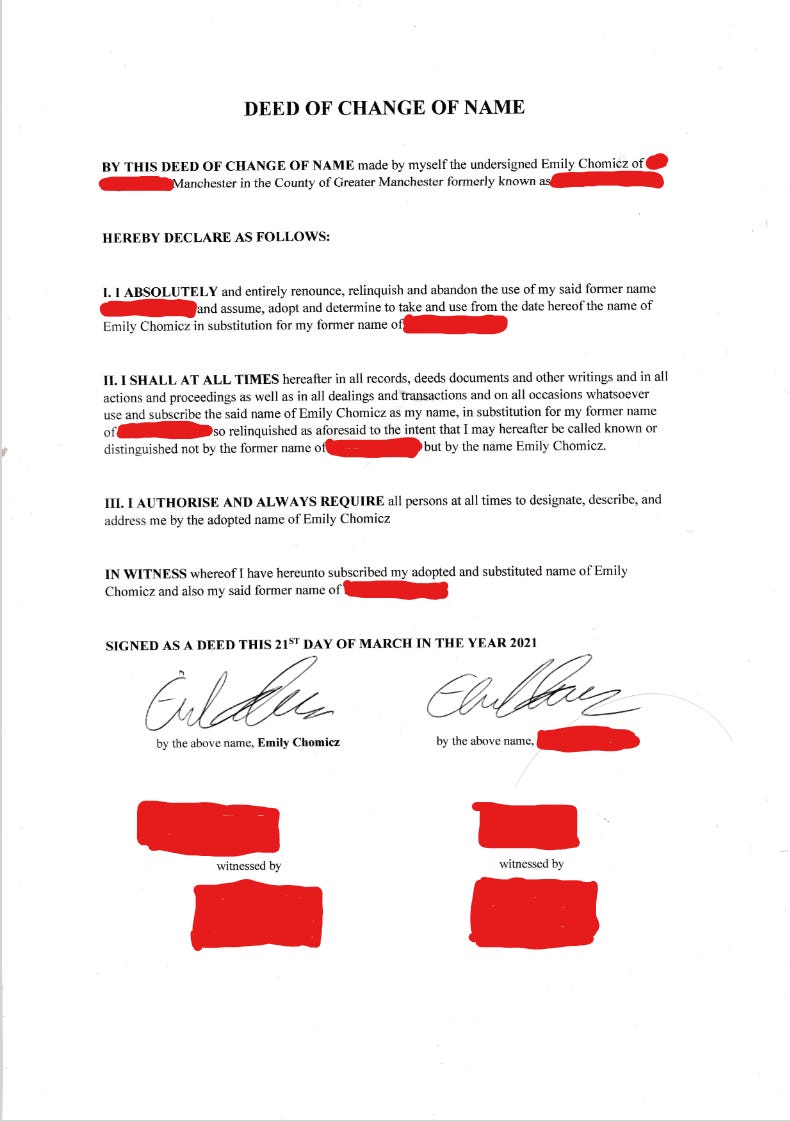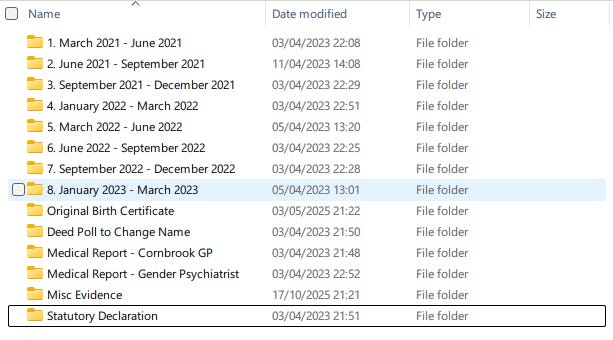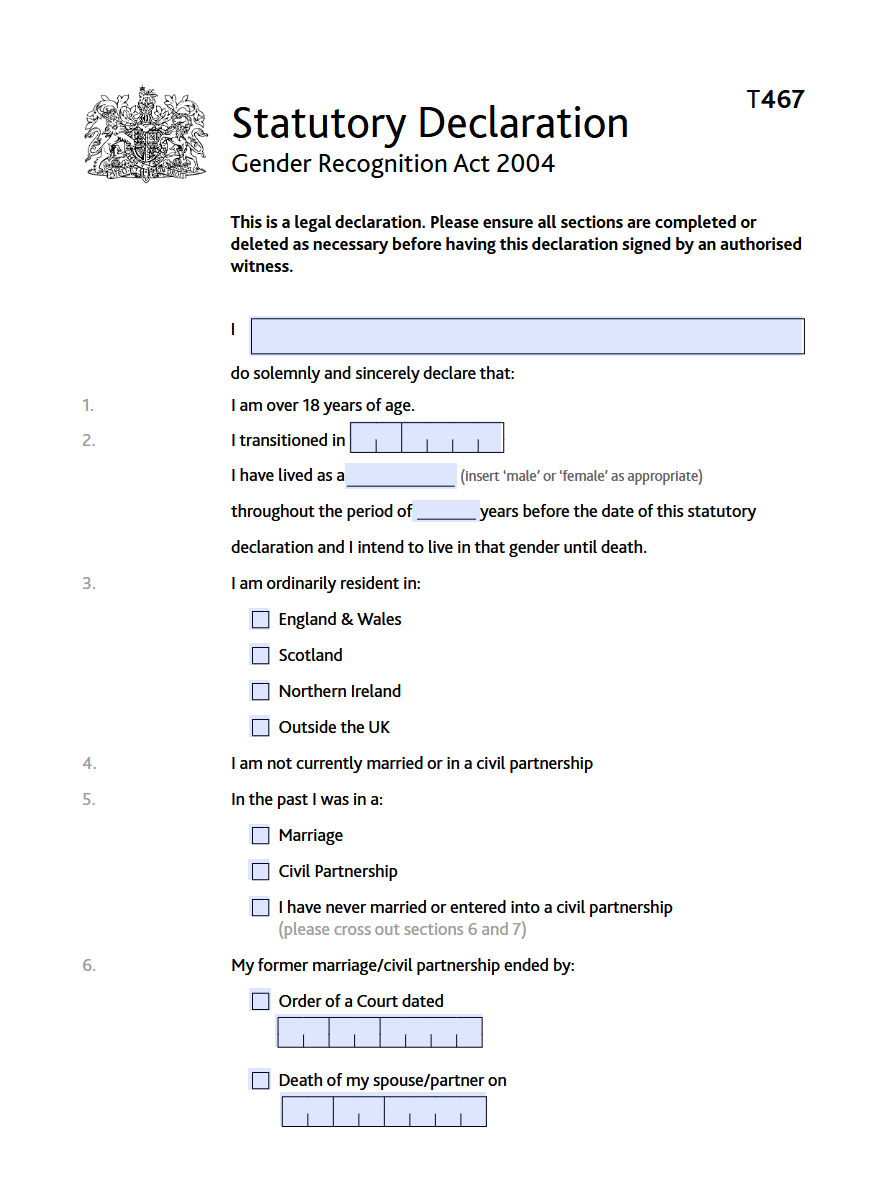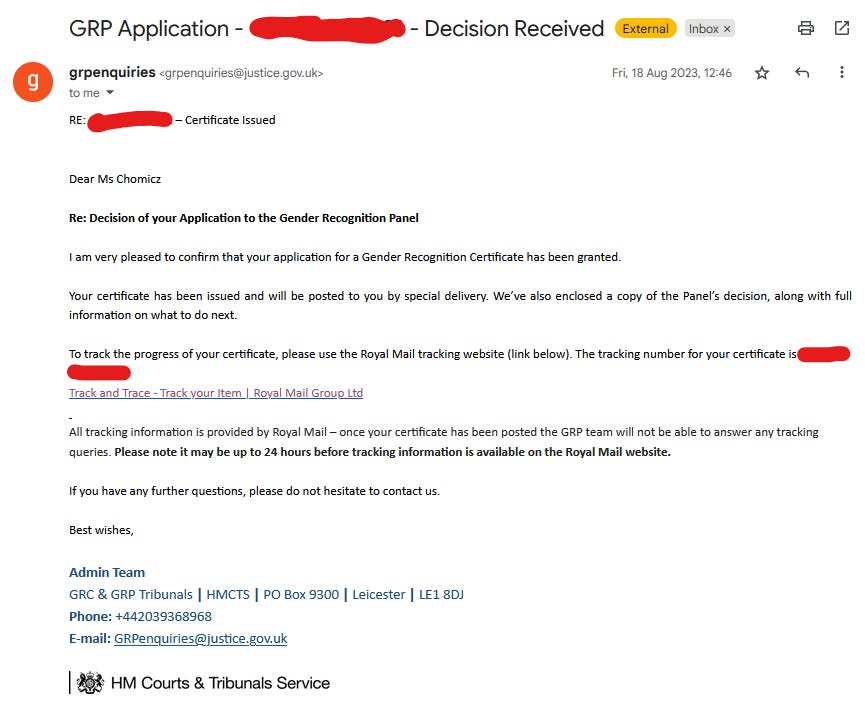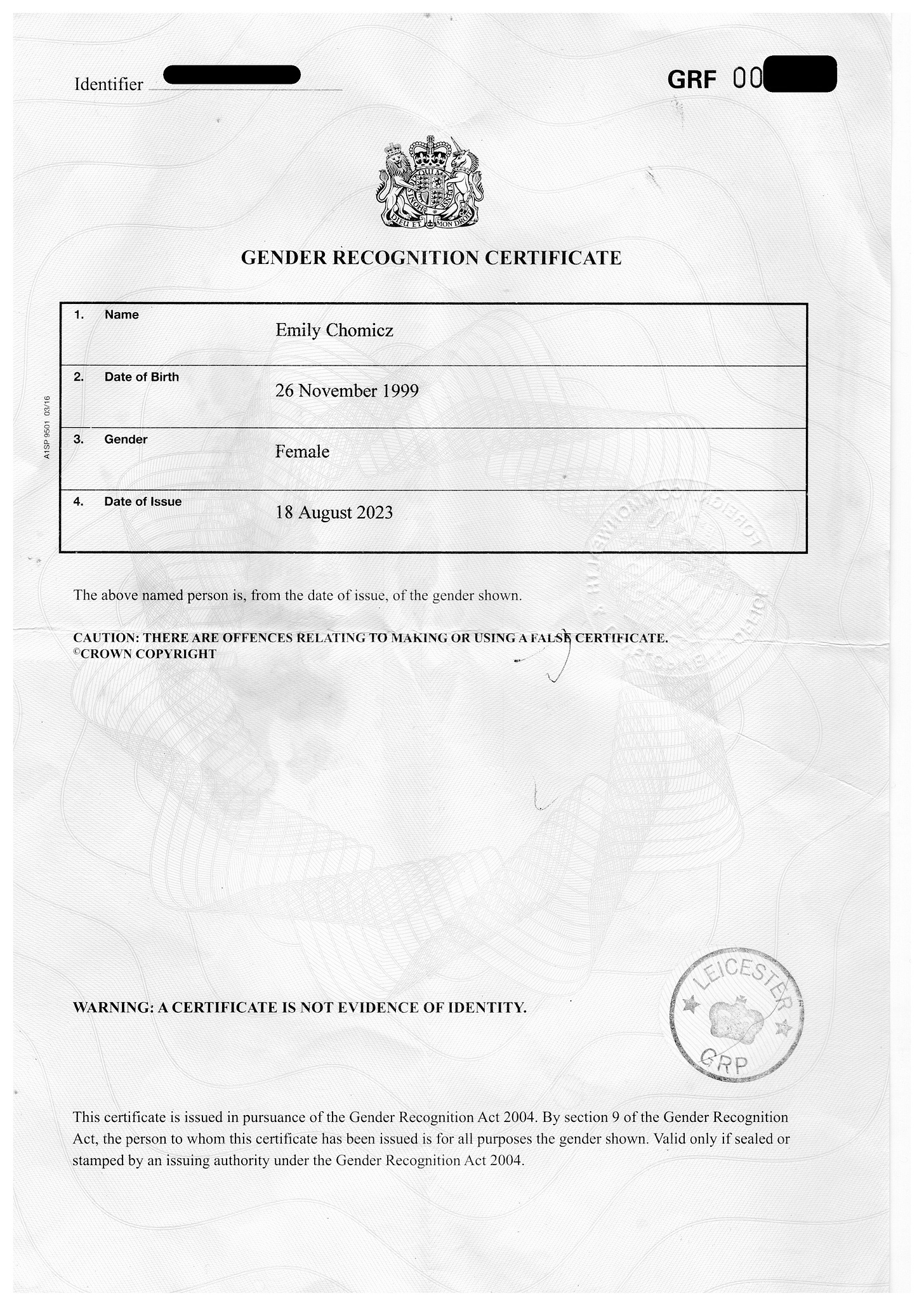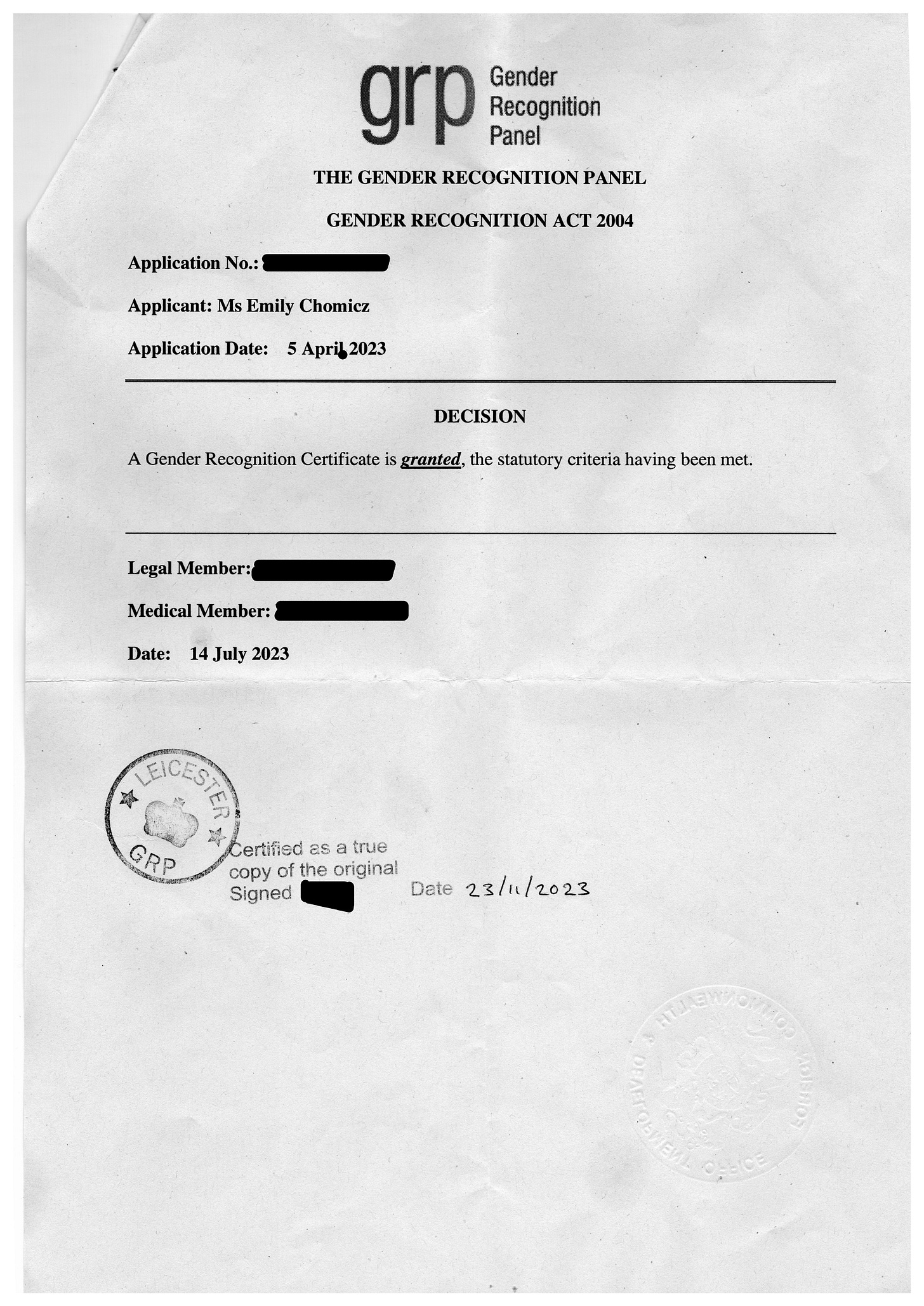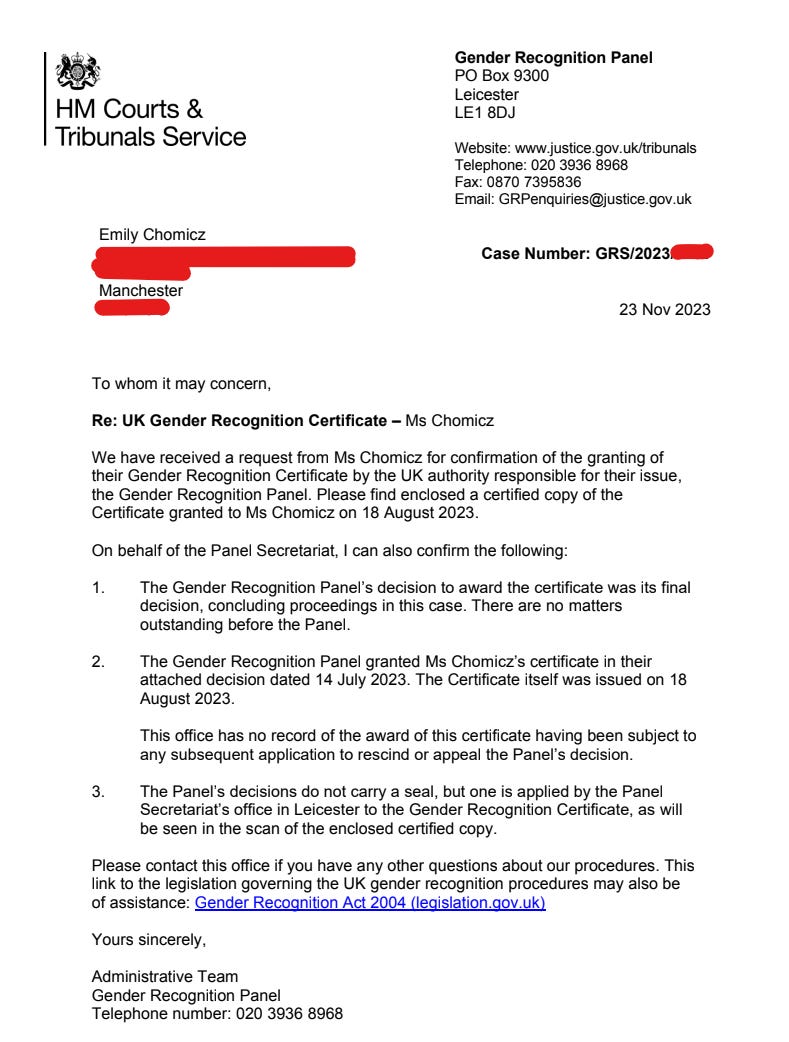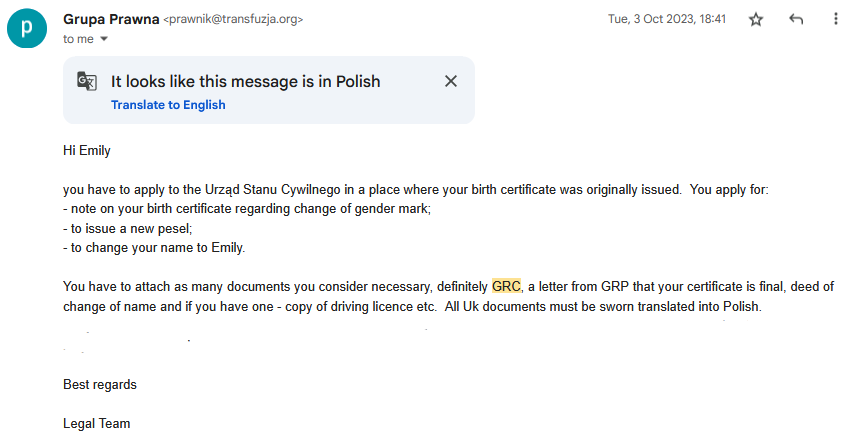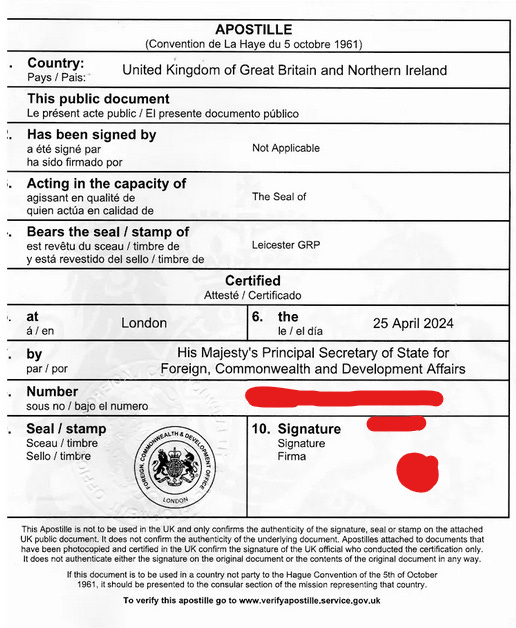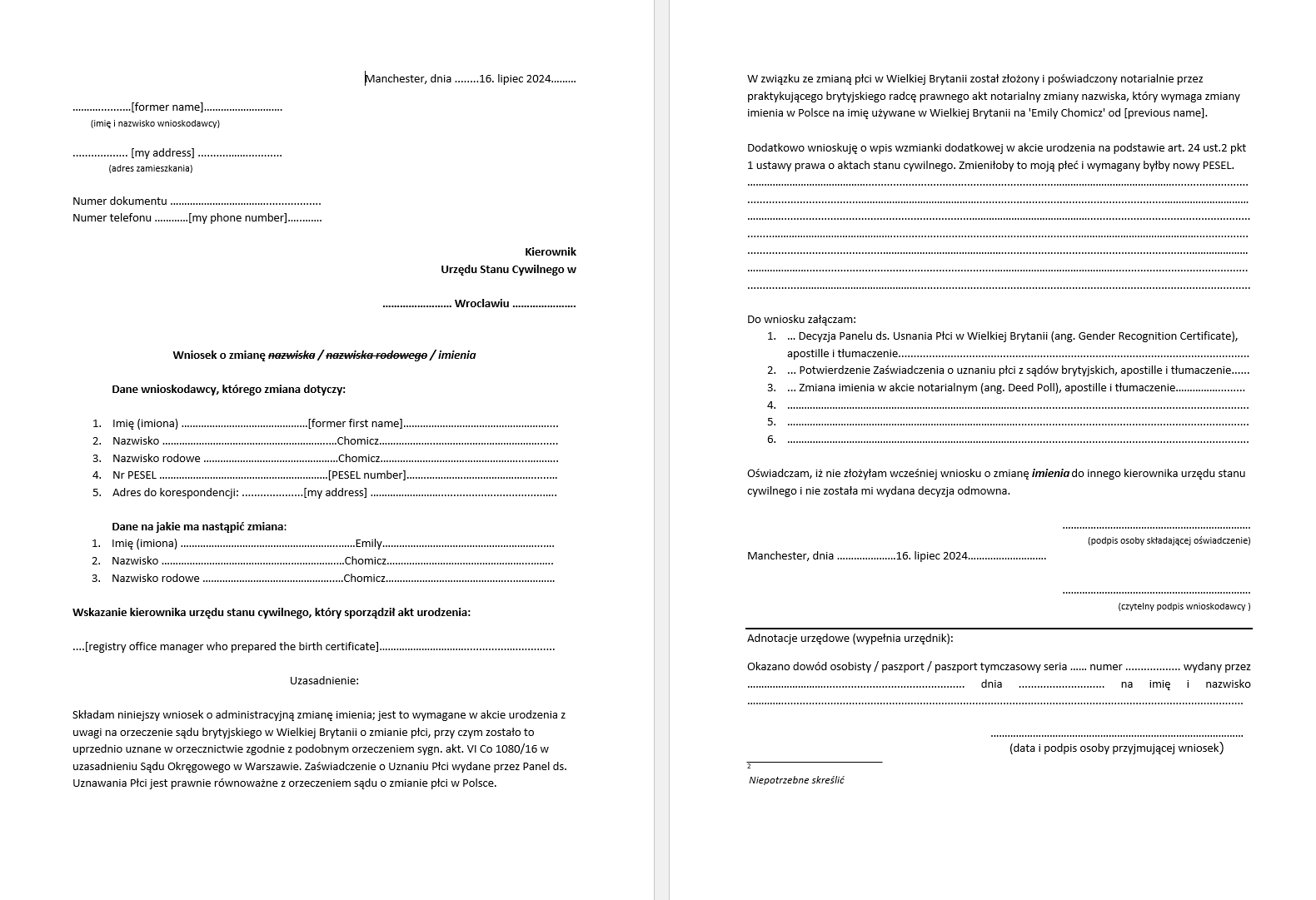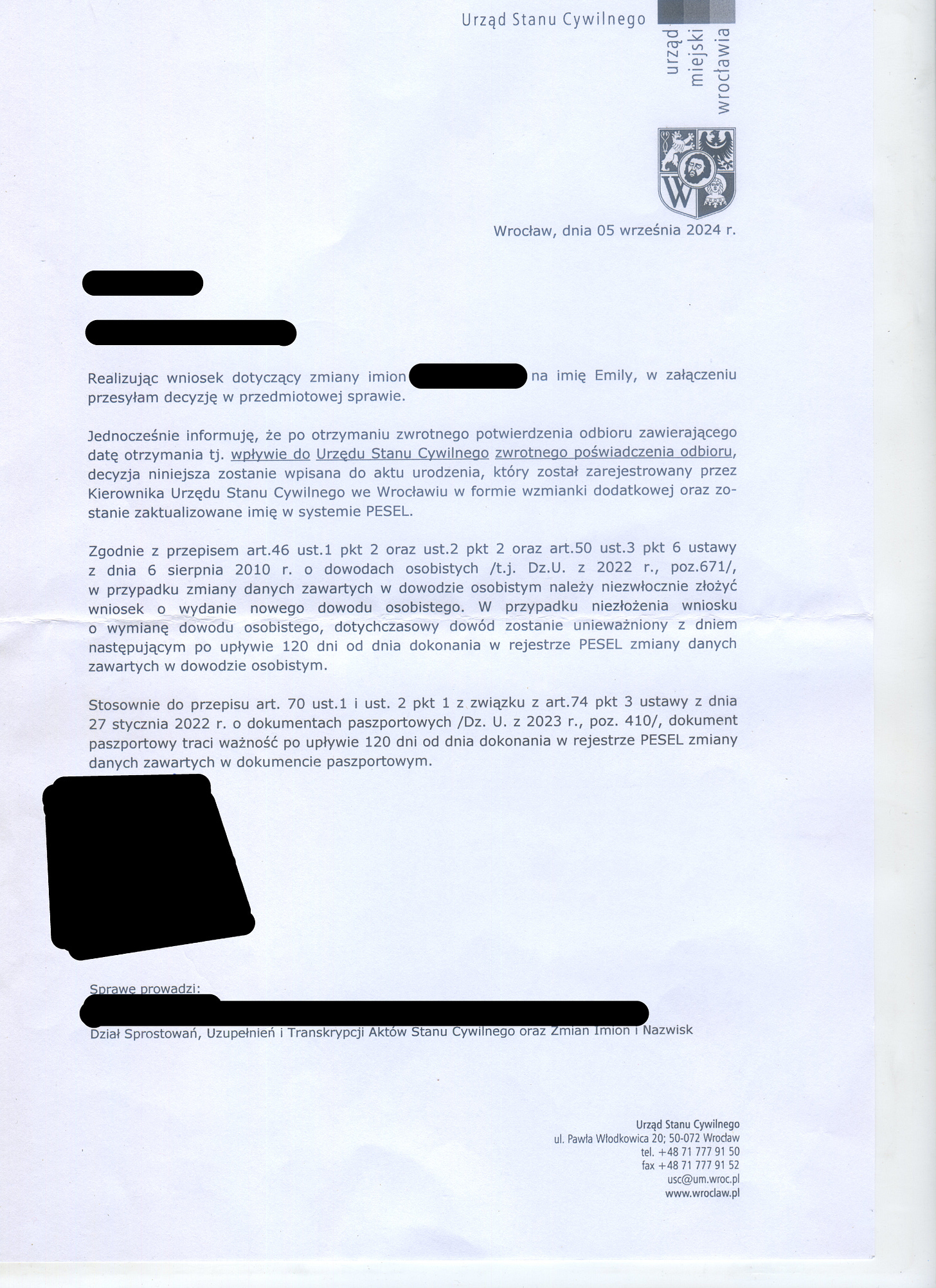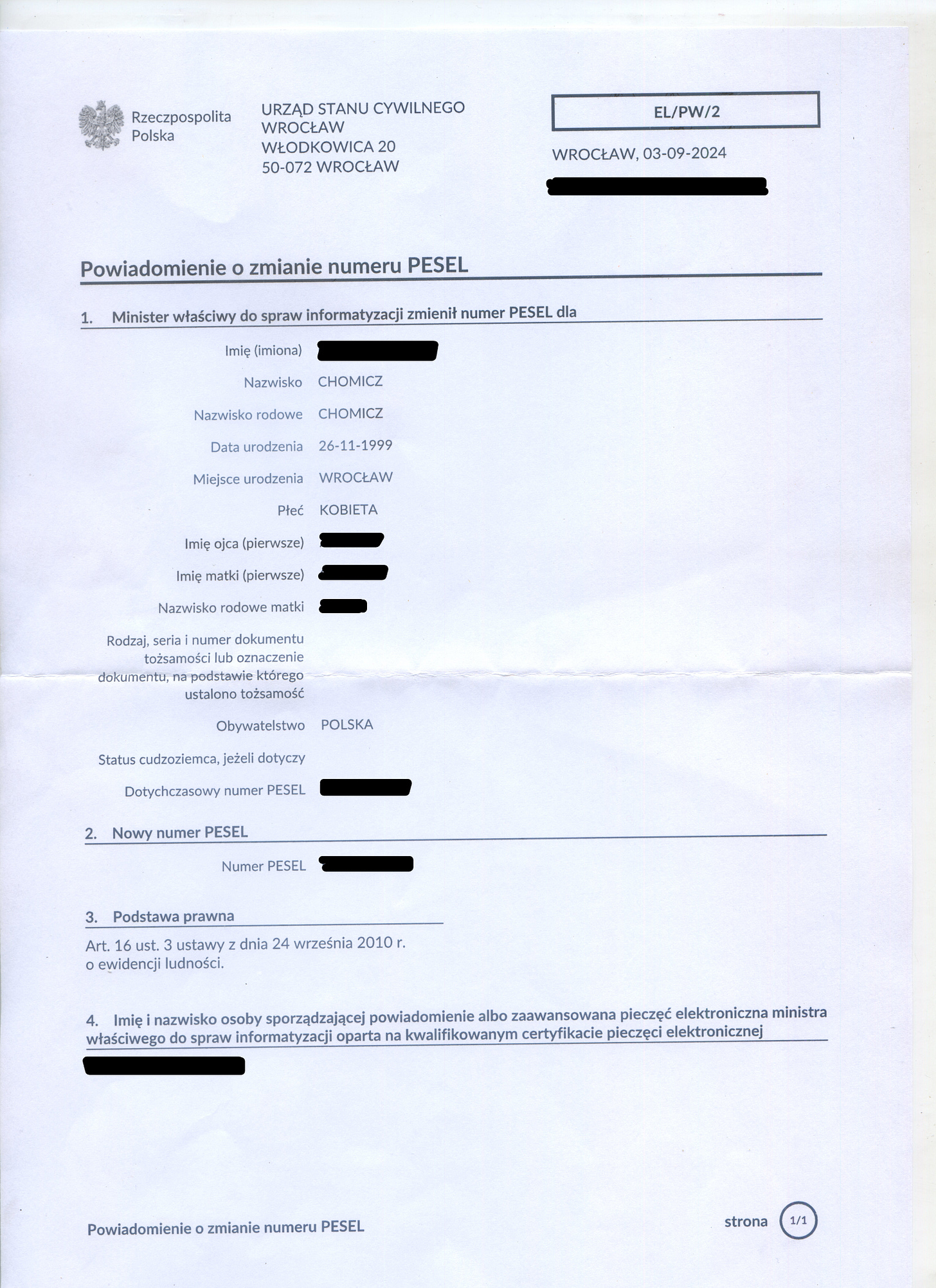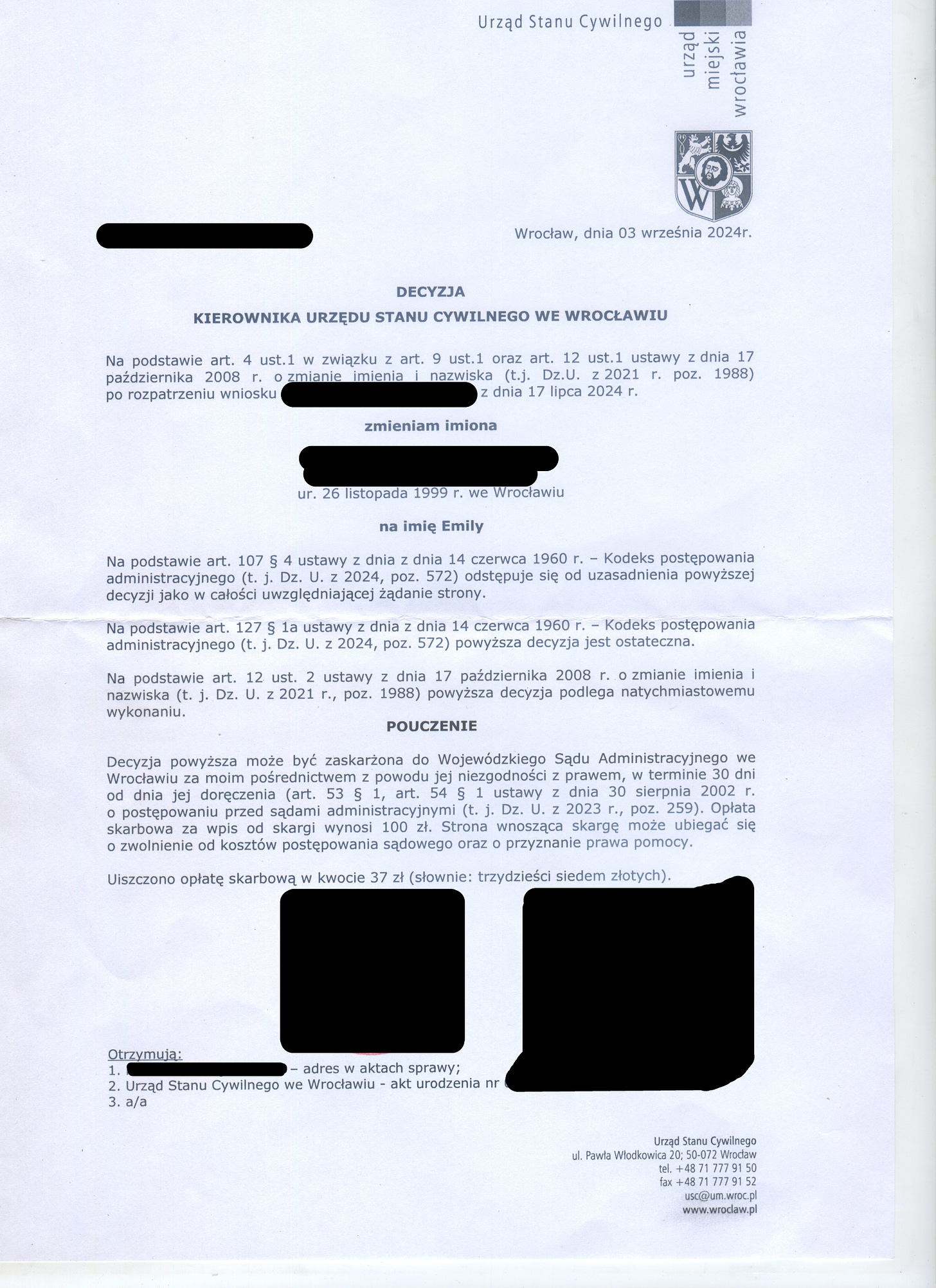Transitioning in 2025: The Comprehensive Guide to Being Trans and Polish in the UK
I went through the opaque systems so you don't have to. In this article, I explore the practical side of my transition as well as a Gender Recognition Certificate & the legal system in Poland.
I’m Polish. I also came out as a trans woman in December 2018. The year is now 2025, and I am still trans, no matter what any court ruling, politician, or government may say otherwise. I went through hell to prove that I was trans.
By reader request, this article is about how I completed my legal transition in Poland at the same time while attempting to navigate also the British process, and the challenges involved. If you want to read more about what I have done with my life in general, please check out my memoir here.
I have separated this article out into easy to understand sections for Polish trans citizens living in the UK to be able to easily understand the tedious process. I am forever indebted to transetytrans on Reddit for helping me out with the steps; her advice has been invaluable to progressing my transition.
I want to highlight while the process is unique to Polish people, it is also an example of how people face insurmountable struggles to transition to this day. We have to see individuals’ challenges in the trans rights movement.
If you experience any issues with this process, message us on Substack, or email me at hello@emilychomicz.com and we will be happy to help out.
And if you find this article useful, why not consider subscribing to Queer Love Riot? It’s free, and every week we post long-form investigative articles about queer matters, politics, public policy and technology. Subscribe today.
1. Getting out of the Egg Stage
I transitioned right at the start of my university education. At the time, there was a vague understanding of trans people, but as we joke in the trans community: We didn’t just appear in 2015, we’ve been around for millennia.
Unfortunately, I had to wait for so long, even though deep down I knew I was trans, as I had no queer resources to draw from at all growing up. This is why it’s so important that we protect libraries from the increasing censorship and intimidation to remove books, as they seek to effectively rewrite our history.
I also ran away from home and became estranged from family, which added an extra layer of difficulty in my transition, as I had to purely trust the people I met. This leads us to nicely to the most important factor in any transition:
Community
I was lucky in my social transition, as I discovered quickly that there were many cis women, trans women and non-binary people who were incredibly accepting of my change of gender which helped with my feelings of dysphoria.
There’s a few types of community that I would recommend looking for:
Small trans communities in your local area - these can be hard to find depending on your location. I find that Eventbrite is useful to find more formalised events, as well as places like universities and libraries.
Online Discord communities - many of these are publicly searchable, and they can be invaluable to trans people who are struggling to find their community. I would avoid engaging with mainstream UK trans subreddits as a form of community as often these can be quite difficult places to be.
The Cities - If you are a trans person in the middle of nowhere, especially in a conservative area, you are going to have a rough time transitioning. I would recommend considering moving to a larger city such as Sheffield, Manchester, or Leeds as they have more resources for queer people.
With that last one, it can be incredibly difficult for marginalised trans people to move to another city, especially if they are also disabled. This means trans people can fall into precarious housing options, as many landlords often find excuses to not rent to people on benefits, even though this was outlawed.
Three options that exist for trans people who wish to move to the cities:
Find a well paying job. Traditionally, many trans women have gone into rewarding careers such as software development, however the IT sector is experiencing layoffs, and the UK’s economic situation is getting worse.
Find a queer house share and hope for the best. House shares are getting incredibly expensive. Unfortunately, what you gain financially, you lose in security; house shares don’t usually come with any kind of tenant rights.
Go to university. This is what I did. I was living in Ellesmere Port, and I applied to the University of Birmingham. Often universities come with foundation courses which have drastically lower grade requirements.
The key here is getting a maintenance loan from Student Finance England. Frustratingly, nowadays quite often this isn’t enough to pay rent, but disabled trans students can apply for Personal Independence Payment. You can also apply as an independent student to get the maximum loan if your relationship with your parents has broken down, or you are over the age of twenty-five so your parents’ income isn’t taken in account when you’re assessed for finance.
Living in a place where you feel safe and comfortable, with a community of supportive people around you, is vital. Transphobia is unfortunately a very common experience, and it can be extremely harmful for your mental health. Having a place where you can retreat to where you can feel safe is crucial.
Trans Friendly Doctors
As a trans person, you will need to pick your doctors very carefully. Pride in Practice certifies surgeries for their awareness of LGBT issues, and is a good starting point. Action for Trans Health also has a spreadsheet of friendly GPs.
In Manchester, I can recommend Cornbrook Medical Practice for being very kind to disabled people, as well as very trans-informed, as several medical practitioners have experience of working with trans and non-binary people. They accept you outside your catchment area: you can opt out of home visits.
I also strongly object to New Islington Medical Practice’s policy on bridging hormones. There’s so many medical resources out there for safe prescribing, and their sad excuse of practicing safe medicine is, quite frankly, pathetic.
Bridging Hormones
Prescriptions by your GP of hormone replacement therapy (HRT) completely depend on the individual doctor. There’s multiple ways in which to have this discussion with your GP, and the possible outcomes as well as challenges.
You could DIY hormones off the internet. I legally cannot tell you where to obtain these hormones, however you could ask trans people in trans communities about how they have procured their hormones. There are also educational videos on how some trans people apply these hormones. Your GP has a duty to prevent harm as per the GMC recommendations. Unfortunately, some doctors still refuse to abide by the GMC guidelines, despite having the ability to prescribe any medication. Usually, this is solved by either a practice complaint, the Patient Advice Liaison Service, or if it gets that far, the Clinical Commission Group or Trust.
Your GP also has a duty of care, and must act to acceptable professional standards. If you have experienced transphobia, or denial of hormones based on transphobia, you may be entitled to compensation. You should record and note any interactions you have with transphobic clinicians.
In the past, I have made arguments in respect to my mental health, which meant that I was able to convince a trans-friendly doctor to prescribe despite no experience. To do this, I printed a stack of paperwork for my doctor with WPATH guidelines as well as Charing Cross GIC guidelines. Technically, this is not an exception that exists in the NHS recommended guidelines, however there are several mental health benefits for anxiety and depression as a result of taking the correct hormones you need. NICE guidelines don’t always reflect practicality.
Referrals to Gender Identity Clinics
It’s a national scandal that Gender Identity Clinics have such excess waiting times. People wishing to see the Devon gender identity clinic have to wait for more than eight years. It’s completely unacceptable situation for the patients.
In recent years, second-wave Gender Identity Clinics have appeared such as Indigo for Manchester and CMAGIC for Cheshire. To access these clinics, you usually have to be referred to a traditional clinic, and then taken off the list.
However, these clinics remain underfunded, understaffed, and dogged with influential clinicians, with poor quality myths and theories about transgender people, causing changes in NHS policy, and gender clinics for trans children to shut down. Trans youth are now currently in limbo, due to recent rulings.
You’re entitled to a referral to a Gender Identity Clinic, where you will be able to access certain essential trans healthcare resources. For example in Indigo:
You can get electrolysis and laser for facial hair, which is something that up to 90% of transfeminine people request. This can be quite transformative for many people, and I got eight sessions funded by the Indigo clinic for free.
You can get voice therapy. Voice therapy is about shaping your voice, and can help with identity. The purpose of the voice therapy is not to necessarily make your voice masculine or feminine, but rather to shape your voice in a way that makes you, you. It’s all about your self-identity.
Access to hormones. The Gender Identity Clinic is able to make more tailored suggestions to your regimen. While I was thankful to have a very understanding, and friendly GP who did most of this already, GICs may be able to prescribe more aggressive regimens for the aim of masculinisation or feminisation & have deeper domain-specific knowledge than your GP.
They do referrals for bottom surgery, as well as chest surgery. There are still ongoing issues at clinics such as CMAGIC, where non-binary people face discrimination and questioning. I would recommend saying you’re just trans.
In order to complete the process, you will have to go through a GIC in order to get a medical report. Unfortunately, there’s no workaround, and it can take years to get seen. It’s why we should implement self-ID in this country.
Name Changes
For most people, a name change will be as simple as performing a deed poll. My deed poll is based off the RocketLawyer website, and therefore I have never had a problem with my deed poll getting rejected as a ‘fake’ deed poll.
For some inspiration, this is my deed poll. After this gets published, I will be uploading this article, as I do with all articles, to Internet Archive. I very strongly recommend you also make several copies with your trans friends.
Anyone can witness a deed poll providing they’re not related to you and they’re over eighteen. Enrolment with the courts is not necessary, it puts your name on the public record, and any organisation asking for this is transphobic. Trans people should not be forced to out themselves publicly.
If you do not have anyone who could witness the deed, a good place to go would be pride events in August, as often the LGBT Foundation has people who are happy to witness deed polls. It’s a rite for passage for any transition.
My last tip here is to use paper that is of a thickness of 120gsm or even more. Printing it on thicker card stock often gives a sense of professionalism, and makes it resistant to water damage over time for important documents. This is a legally binding, valid document, but you may get questioned over it.
NHS Number Changes
The NHS is an incredibly fragmented system. This means that changes your data at the GP, do not always reflect properly in secondary and tertiary services, such as hospitals, and clinics. Enable your Summary Care Record at your GP surgery in order to help paramedics and doctors in an emergency.
Your NHS gender field can changed in two ways:
Your title can be updated to reflect your preferred title. In some old NHS systems, these titles were historically tied to gender for error validation. These systems are being phased out and you can put Mx in these cases.
Your gender can be changed by changing your NHS number. You just ask the GP surgery, and you should make a practice complaint and/or change GP surgeries if they refuse; this is an established administrative practice.
Your surgery will remove any mentions of your previous gender as much as possible. In some cases, the way that certain procedures are redacted is quite hilarious. Unfortunately, it’s up to other services to do the same redactions.
Mental Health
Most of us have mental health issues, with a staggering 46% of trans people expressing suicidal ideation, as a result of the traumatic experiences which trans people face. Medication exists, which can help, but many of us get stuck on waiting lists. I’ve personally had to resort to begging for trauma therapy.
In most places, you can avoid having the conversation with your GP entirely, and you can just self-refer yourself to a service called Improved Access to Psychological Therapies, if your mental health difficulties are not too severe.
However, if you do have severe mental health difficulties, I extend out my compassion to you as the mental health system simply does not work in many areas such as Manchester. I have made several complaints about the process.
And finally, there are crisis cafes in towns that you can go to, which are non-clinical spaces that often de-facto double as emergency counselling. If you live in Manchester, I have an article about where to access these spaces.
Mismatched IDs - What can you do?
You may find yourself in a situation like I did, where you may have an ID in your former name, and a deed poll in your new name. For British citizens, this is a fairly straightforward fix as you can send the Passport Office either a deed poll, a Gender Recognition Certificate, or a letter from your doctor.
Provisional driving licenses are also fairly easy to obtain, and all you need for a change of deed poll. Unfortunately, you will still be subject to the DVLA fitness to drive rules, even though you might have absolutely no intent to.
In my case, I am prohibited from driving due to my dissociative seizures, so I instead applied to the English National Concessionary Travel Scheme. A neat thing about the ENCTS is that it also allows you to vote, so it’s an accepted ID.
If you need an ID to buy alcohol with, or set up benefits, a CitizenCard or equivalent PASS scheme card is obtainable by having a professional person, such as a doctor or teacher sign it. Not all doctors are willing to countersign.
To amend your birth certificate, this is what the Gender Recognition Process is for. In my case, my birth certificate didn’t get amended by the British legal process as I was born in Poland, but this is the case for natural-born citizens.
For more advice on the practical side of transition, I highly recommend the Gender Construction Kit, a fantastic website ran by trans volunteers.
2. Applying for a Gender Recognition Certificate
The Advantages to Holding a GRC
The Gender Recognition Process is about changing your legal gender on your birth certificate. It is a legal process to rectify the old incorrect gender.
Aside from the advantage of being sent to the right prison, supposedly, applying for a Gender Recognition Certificate means that you officially get recognised by the state as a person of interest. The key provision for us is Section 22, Gender Recognition Act 2004, which outlines the protections.
It is an offence for a person who has acquired protected information in an official capacity to disclose the information to any other person.
Unfortunately, this crucial protection was once already weakened by the The Gender Recognition (Disclosure of Information) (England) Order 2022 for the Cass Review for regarding under 18s. We can’t allow them to do this again.
The biggest effect is that no civil servant at any government organisation can view your records without senior approval. With HMRC, you can call Public Hotline 1 instead to do your taxes, which is nice because it’s literally 12x faster.
The Disadvantages to Holding a GRC
It’s a bit dystopian. The legal system will forever hold the information that you are indeed, trans, and while the Gender Recognition Act has protections against unauthorised disclosure, historically the government has had issues protecting records relating to marginalised minorities. That’s the trade-off.
The extra protections can get annoying in day-to-day life. As a transgender journalist, I am at extra risk, but not everyone with a Gender Recognition Certificate needs protecting through a complicated system of checks and balances. Sometimes, your records won’t show up at all. It’s a nightmare.
Non-binary people are not recognised to this day. There have been several legal challenges attempted, but until the government changes the Gender Recognition act, you will have to choose between male or female. I’m neither.
The Pointless Process of Gender Evidence
The accepted documents webpage isn’t very clear on what documents are needed. Essentially, you need at least one piece of evidence for every quarter in the last two years, as well as a piece of evidence within the last two months.
Evidence does not have to be formal. It can be as simple as sending utility bills, rent agreements, letters from school, your employer, or anyone who you have changed name with using your deed poll. It’s important to do this ASAP.
Your evidence should be dated, and the evidence should contain either your correct gender, the correct title, You should end up with eight pieces of evidence in total. I would also recommend you send in a few extra bits as well.
This is how I have organised my evidence folders. I would recommend you adopt a similar format, as there are more things you will need to send in.
The Ludicrous Statutory Declaration
You need to fill in a statutory declaration available on gov.uk. The form you will need is T467, the Statutory Declaration, Gender Recognition Act 2004.
This form will need to be notarised. You can find a notary near you on the Notaries Society website, and the fee will be fixed at £5 as per the The Commissioners for Oaths (Fees) Order 1993, or alternatively, you can also seek a solicitor. The option the most convenient for you depends where you live.
In my case, I did use a solicitor for this declaration. As this is technically a sworn oath, the process is ridiculous, as I was required by the solicitor to raise my hand to confirm that all the information contained within the document was accurate.
So in other words - I had to swear I was trans, and I wasn’t lying.
The Two Pointless Clinical Gender Reports
Once you have the statutory declaration, and your pieces of evidence, you still need more. You will also need two medical reports, one from the clinic that gave you an official diagnosis of gender dysphoria, and one from your GP.
Your gender psychologist should be familiar with the forms, but essentially they need to confirm your clinical history, when the diagnosis was made, and also what evidence was used. This will be information that you gave to them in appointments.
The GP report is more of a formality. There are no prescribed requirements, but I would speak to your GP to essentially re-use the information from the letter from the gender psychologist. This letter is absolutely pointless, and only serves as a form of institutional transphobia to absolutely ‘make sure’ you are indeed, trans.
In my case, my gender psychologist didn’t bother with the provided template, instead choosing to disclose all my medical notes instead. At least they did ask me what I wanted included in the letter. This process felt really violating.
Don’t worry about the section that requires you to talk about bottom surgery, because yes, that is a required section, even though not all trans people want surgery. You do not have to have undergo surgery, see the guidance on gov.uk.
My GP report was brief and simple, and simply consisted of repeating the same thing as my gender psychologist said. Please note that a ‘gender dysphoria’ and ‘gender incongruence’ diagnosis are both legally the same.
Sending in the Postal Evidence
And finally, once you have completed the online form, it can take up to 22 weeks to get a decision back. You will be required to send in your old birth certificate. In my case, I also needed to translate the old birth certificate.
If you do forget your birth certificate however, I advise you to not have a mental breakdown at the Manchester Arndale Post Office like I did. Instead, just email GRPenquiries@justice.gov.uk explaining the situation, and send it in.
For your convenience, the postal address you need to send any documents is: Gender Recognition Panel, PO Box 9300, Leicester, LE1 8DJ.
One final note is that in my case, I wasn’t able to show updated ID, which is usually the evidence the Gender Recognition Panel expects. I believe I did send them an email or leave a note about that, and were absolutely OK with it.
Many weeks later, I got my Gender Recognition Certificate in the post by courier, as well as an attached court decision letter, as well as the explanatory note for the documents. The process usually ends here, but I had more to do.
I paid the GRC fee on the 5th May 2023, and finally got my decision on the 18th August 2023. I got an email about it before it was sent to me in the post.
This is what the Gender Recognition Certificate looks like. Seeing this thing in person was a really strange experience. I felt amusement, bemusement, and complete bafflement at this whole circus. All this, for the bloody obvious.
Oh, and… DON’T LOSE THIS CERTIFICATE! This is the only copy you will get.
Here’s the associated court letter. As you can see, the Gender Recognition Certificates are supposed to be granted on statutory criteria being met only. Yet, to this day, the Gender Recognition Panel acts in a discriminatory way.
3. Polish Recognition of My Gender
This is where we get from an quite frankly batshit process, to an insane process where you will spend tons of money trying to get the paperwork.
Up until very recently, the Supreme Court of Poland required you to sue your parents in the Polish process, for writing down your gender wrong at birth. If your parents weren’t alive, the court literally appointed a random legal guardian to be your defendant. It sounds insane that a stranger had to defend against your transition in that situation, but that was literally how the law was written.
Poland still doesn’t actually really have a process for what paperwork you will need, and it depends entirely on the judge. Additionally, if I went through the Polish process, I would have needed to likely adopt “Emilia”, and not Emily, due to the language conventions of Polish. It’s all entirely based on discretion.
You can see why I went through the British process instead, as the British process, while slow, convoluted, and discriminatory, didn’t involve me literally speaking to a judge about how I felt about being trans. That’s pretty insane.
The Extra Gender Recognition Letter
What I have received from the Gender Recognition Panel, unbelievably, isn’t enough. Due to the quirks of the Polish legal system, you will also need to request this letter from the Gender Recognition Panel for this to work.
This is based on the advice of the legal team of Transfuzja, a great Polish charity which provides legal, and psychological support for trans people. The Civil Registry Office will need to issue an addendum to your birth certificate, as well as issue a new PESEL, as well as your name on the Polish systems.
Your PESEL number, if you cannot find yours, is the Polish equivalent of an British National Insurance number which is found in a Polish passport. The national insurance number change is due to a quirk in Polish systems where National Insurance numbers are actually gendered, similar to NHS numbers.
Apostilles & Translations
You will then need an apostille for every single legal document you send to the Civil Registry Office, including the deed poll, the gender recognition certificate, the court decision letter, as well as the extra court decision letter. I believe I paid £135 for all these documents. The cost of this process is crazy.
Apostilles are the documents that verify the stamps, signatures, and seals on all the letters. In my case, the Foreign Office took months, and when they finally got back to me, it turns out that the Gender Recognition Panel had stapled a GRC photocopy to it, which isn’t allowed. The Foreign Office, instead of removing that page, just sent it all back. At this point in the process, I was so close to stopping, but I kept going.
You will then need a sworn translator by the courts of Poland to translate the apostilles and the original documents, which cost me £110. I used the services of Edyta Tomaszewicz, she was incredibly professional and did it pretty fast.
The Legal Application for Change of Name
LEGAL DISCLAIMER:
I am a trans journalist that spends too much time looking at legislation. I am not a lawyer, though this article proves you can do this on your own.
Thankfully, I was born in Wrocław, a city where you can walk around as an openly trans person and nothing will happen to you. I know this, because I was in Poland a month ago. This meant at least, my case was straightforward.
In order to submit the correct forms, you need to find the Civil Registry Office (pl. Urząd Stanu Cywilnego) you were born in, and attempt to contact them. I spoke to the Wrocław Civil Registry Office by phoning them up and asking them in Polish.
They then proceeded to send me an application for a change of name. I based my legal argument in case law akt. VI Co 1080/16, which is a decision made in 2018 that Gender Recognition Certifications are equivalent to a decision by a judge in Poland.
This exact case law is important, as we’re using the fact that in 1977 there was a legal case where foreign documents must be considered as valid evidence. Your Civil Registry Office may have a different form, but it’s the same idea here.
I then explained further in my justification in the form that as a result of the Gender Recognition Panel decision, I require the Polish Registry Office to change my name, and my PESEL number, as mentioned before above in Transfuzja’s email.
Manchester Consulate & New Passports
This all needs to be sent to Poland through the consulate, as well as your apostilles, translations, and original documents. You just need to book an appointment with your local consulate or embassy, and they need to send your documents over to the Civil Registry Office. It takes about two weeks.
In my case, I tried to do this over Christmas, which meant that the process was delayed endlessly. This was the most frustrating part of the process, as the consulate in my case actually didn’t send off the documents for months.
Once the Civil Registry Office receives your application, you should then eventually receive similar documents to what I have received from Poland:
You need to update your national ID and passport within 120 days. This letter also confirms the gender addendum to the birth certificate.
A confirmation of your new PESEL number. This allows for the official gender change to happen in the system.
The decision by the manager of the Civil Registry Office to change your name. As it was the manager I was speaking to over email, it came as no surprise that she did, in fact, approve my change of name.
Finally, you will need to obtain a new passport at the consulate. which cost me £92, as well as £34 fee for a temporary passport. This step is the easiest, and you will just need to book in a renewal appointment as you would usually.
By this stage, you can stop identifying yourself in your former name to the consulate, and you can simply use your new, hard-earned name and gender!
4. My Thoughts on This Process
Officially in terms of paperwork, my earliest piece of evidence dated from February 2021, and I got my final decision in November 2024. The legal part of the process took almost four years to complete, never mind the research.
I am thankful for all the help I have received, from transetytrans on Reddit, to the very friendly solicitor in Heald Green, to the absolutely invaluable and crucial emotional support I have received from friends and my supporters.
Throughout the process, I was discriminated against by landlords, employers, shop workers, and everyone else for not having the exact identity documents in the interim to even order a phone online and collect it. I am looking at you, Three, for not deviating from policy which currently excludes trans people.
So I simply took my old ID, and my deed poll, to Vodafone. The guy behind the counter was astonished by the fact that Three was willingly giving up business, given I followed their criteria: I showed Photo ID, and a deed poll.
I also experienced discrimination and ableism by Pearson Vue, as they wouldn’t accept either my government-issued concessionary pass, or my PASS card. They would make absolutely zero exceptions from this policy.
The takeaway from experiencing discrimination, is that you have the power to choose. The companies, organisations & places who discriminate and/or promote hate against others, should not receive an ounce of care from you.
I hope this article has made the case for self-ID. Theresa May tried to introduce some humanity into this system, but successive Conservative governments have abandoned the idea. The current GRC process does nothing but traumatise trans people & make us prove our own existence.
If you have found this informative, please feel free to share this to anyone who needs advice on how to transition, how to do their Gender Recognition Certificate, or navigate the Polish legal system to their change name and gender.
Written by Emily Elżbieta Chomicz for Queer Love Riot, a new independent queer outlet for queer affairs, politics, technology, and public policy.





